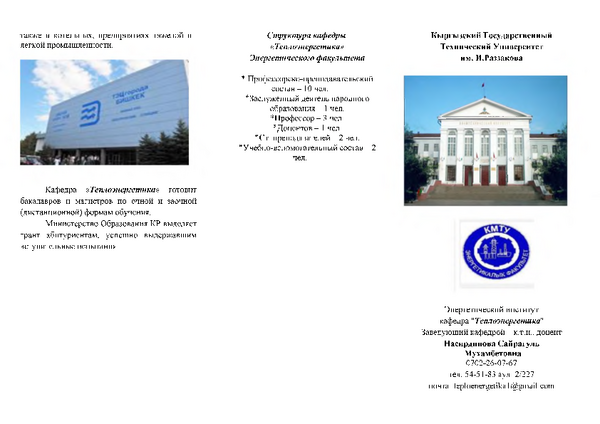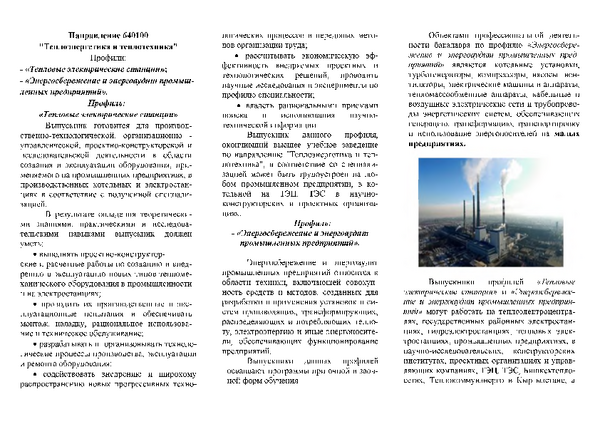Applicant
Here you can learn about the areas and social fields in which the department trains bachelors and masters.
Direction 640100 “Thermal power engineering and heating engineering”
Profiles:
- “Thermal power plants”;
- “Energy saving and energy audit of industrial enterprises.”
Training is conducted by the Department of Thermal Power Engineering
Qualification
| Form of study
| Duration of training
| Language of instruction
| Tuition fee for 1 year (contract), som | Name of mandatory tests |
bachelor | full-time | 4 years | Russian | 41700 | Basic test in physics or mathematics |
correspondence | 5 years | - | - | ||
master's degree | full-time | 2 years | - | - | - |
Enrollment in budget and contract forms of education is made only based on the results of nationwide testing. Training is conducted on a budget and contract basis; full-time education. The main language of instruction is Russian.
To participate in the competition for grant places, in addition to the main test, a subject test is required, which is indicated in the corresponding field of study.
Profile "Thermal power plants"
Within the framework of the Thermal Power Plants program, bachelors are trained who are able to work effectively in the field of design, construction, research, use and operation of equipment in industrial enterprises, industrial boiler houses and power plants.
The graduate is prepared for production and technological, organizational and managerial, design and research activities in the field of creation and operation of equipment used in industrial enterprises, industrial boiler houses and power plants in accordance with the specialization received.
Distinctive features of the program:
As a result of mastering theoretical knowledge, practical and research skills, the graduate should be able to:
· carry out design and calculation work on the creation and implementation of new types of thermal mechanical equipment in industry and power plants;
· carry out their production and operational tests and ensure installation, adjustment, rational use and maintenance;
· develop and organize technological processes for the production, operation and repair of equipment;
· promote the introduction and wide dissemination of new progressive technological processes and advanced methods of labor organization;
· calculate the economic efficiency of implemented design and technological solutions, conduct scientific research and experiments in the specialty profile;
· possess rational methods of searching and using scientific and technical information.
A graduate of this profile, who has graduated from a higher educational institution in the field of "Thermal Power Engineering and Thermal Engineering", in accordance with his specialization, can be employed at any industrial enterprise, in a boiler room at a thermal power plant, thermal power plants in scientific, design and design organizations.
Learning outcomes
Key competencies:
Know the basic laws of thermodynamics, hydraulics and heat and mass transfer in relation to work processes occurring in modern steam and hot water boilers.
Know the basics of mathematical analysis and modeling, theoretical and experimental research of boiler Be able to carry out thermal, aerodynamic, and hydraulic engineering calculations of boilers.
Be able to analyze the operating conditions of boilers and boiler equipment under stationary and peak conditions.
Possess basic modern methods for calculating boiler equipment.
Possess modern methods of analyzing the operation of heating equipment, boiler plants and steam generators.
plants and steam generators.
Employment and career
Organizations and enterprises of possible employment:
research and design heat and power institutes,
combined heat and power plants,
state district power plants,
hydroelectric power stations,
thermal power plants,
industrial enterprises,
Combined heat and power plant,
Thermal power plants,
Bishkekteploset,
Teplokommunenergo,
boiler houses, heavy and light industry enterprises.
Syllabus
Compulsory disciplines
Mathematics
Physics
Manas studies
Engineering and computer graphics
Informatics
Kyrgyz language
Russian language
Foreign language (English)
History of Kyrgyzstan
Physical culture
Applied mechanics
Philosophy
Geography of Kyrgyzstan
Domestic history
Materials Science
Economy
Technical gas dynamics
Theoretical foundations of electrical engineering
Electrical machines
Power supply in heat power engineering and heat technologies
Metrology, standardization and certification
Strength calculations in thermal power engineering
Power supply in heat power engineering and heat technologies
Reliability of thermal power equipment
Electrical equipment of power plants
Economics, organization and production management
Life safety
Elective disciplines
Introduction to Energy
Economy
Engineering psychology
Production and distribution of energy carriers in industrial enterprises
Energy use in energy and technology
Testing and adjustment of thermal power equipment
Hydraulics and pumps
Thermal power systems of industrial enterprises
Legal basis of economic activity of enterprises
Environmental technologies at thermal power plants
Optional disciplines
Disciplines of the profile “Thermal power plants”
Physical foundations of thermal power engineering
Theoretical foundations of heat engineering
Mathematical foundations of thermal power engineering
Basics of district heating
Design of thermal power equipment
Numerical methods for modeling heat and power processes
Auxiliary equipment and pipelines
Structural materials in thermal power engineering
Production and distribution of energy carriers in industrial enterprises
Boiler and steam generator plants
Fuel management and ash removal
Water treatment at thermal power plants
Thermal control and automation
Kyrgyz State Technical University named after. I. Razzakova (KSTU) is the flagship of engineering and technical education in Kyrgyzstan. The university trains highly qualified specialists in various fields for our republic, near and far abroad countries. Today, KSTU is successfully implementing multi-level training, opening new areas of training for bachelors and masters, expanding international relations, and concluding long-term partnership agreements. We work very closely with leading Russian universities, such as the Moscow Energy Institute, Moscow State Technical University. Bauman, Baltic State Technical University “Voenmekh”, etc. The Energy Faculty trains specialists in the following areas: “Electrical power engineering and electrical engineering”, “Thermal power engineering and heating engineering” and “Technosphere safety” in 11 bachelor’s educational programs and 9 master’s educational programs.
The faculty employs 128 teachers, of which 9 are doctors of science and about 40 candidates of science. The number of students studying in the full-time and distance learning departments is more than 1900, of which 1800 are studying at the bachelor's level, 114 at the master's level, and 16 postgraduate students at the postgraduate level.
In the 50s of the last century, in connection with the intensive development of hydropower resources, the implementation of a program for the construction of power plants and high-voltage power lines, the need arose in the republic for the electrification of production and all agricultural sectors, as well as for the training of energy personnel, which was a requirement of the time.
In 1953, on the basis of the Kyrgyz State Pedagogical Institute named after. M.V. Frunze (current Kyrgyz National University) created a technical faculty. A department for training energy specialists was opened at the faculty, and 25 students were admitted to the specialty “Electrification of Industrial Enterprises.” Based on Resolution No. 532 of the Council of Ministers of the Kyrgyz SSR, the Kyrgyz State Polytechnic Institute was organized. The newly founded Kyrgyz State Polytechnic Institute needed to organize the opening of mining, construction, energy, chemical and technological faculties and admit two hundred students on October 1, 1954. General education and technical departments were opened at the institute with the strengthening of their material and technical base. In 1954, the departments of “Philosophy and Social Sciences” and “Physics” were created. In the first, 1954-55 academic year, 68 students studied in the specialty “Energy”.
In the first years, the faculty was called construction and energy, only in 1957 it was divided into two independent ones - construction and energy. In 1957, the Faculty of Energy was founded, which has preserved its identity, traditions and experience for more than half a century. “Thermal power plants” is a basic profile of heat power engineering, heat engineering and heat technologies. TPP includes the study of thermal power plants, energy supply systems, high and low temperature technologies.
The graduate acquires the ability to master the skills of design, technological, organizational, managerial, and research activities, capable of performing installation and adjustment work, operation and maintenance of equipment, carry out design and technological activities, including the development of structural elements and technological justification, the use of information technologies in the design of thermomechanical equipment.
To apply to KSTU for the profiles of the Thermal Power Engineering Department, the following documents are required:
For applicants — graduates of general secondary schools, lyceums, boarding schools, and VET institutions (vocational lyceums):
- Certificate of relevant education;
- ORT (National Testing) certificate;
- Passport or other identity document;
- Copy of the military registration certificate (for persons liable for military service);
- 4 photographs (3×4 cm).
For applicants — graduates of secondary vocational education institutions (technical colleges, technicums):
- Diploma of secondary vocational education;
- Passport or other identity document;
- Copy of the military registration certificate (for persons liable for military service);
- 4 photographs (3×4 cm).
For foreign citizens:
- Certificate of relevant education (with translation into Russian);
- Passport or other identity document;
- Copy of the military registration certificate (for persons liable for military service);
- 6 photographs (3×4 cm);
- Medical certificate form No. 086-U.
Accommodation
Dormitory accommodation is provided for non-resident students.
Contact Information
720044, Bishkek, Chyngyz Aitmatov Avenue (former Mira Ave.) 66, KSTU
Tel.: +996 (312) 54-19-21 (Admissions Office)
E-mail: online@kstu.kg
Tel.: +996 (312) 54-51-51 (for international students)
E-mail: international@kstu.kg
Fax: +996 (312) 54-51-62






